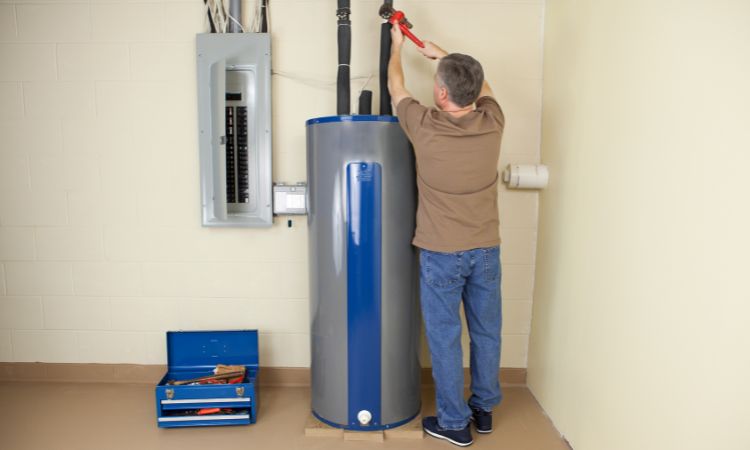Handling Everyday Heater Issues
Handling Everyday Heater Issues
Blog Article
Are you on the lookout for advice around Common Problems with Tank Water Heaters?

Imagine starting your day without your regular warm shower. That currently sets a poor tone for the remainder of your day.
Every house requires a reliable water heater, however just a few know how to handle one. One simple way to keep your water heater in leading form is to check for faults routinely as well as fix them as soon as they appear.
Bear in mind to shut off your hot water heater before smelling about for faults. These are the hot water heater faults you are more than likely to come across.
Water also hot or too chilly
Every water heater has a thermostat that establishes how hot the water gets. If the water entering your residence is too hot despite setting a practical optimum temperature level, your thermostat might be faulty.
On the other hand, too cold water may be because of a stopped working thermostat, a damaged circuit, or incorrect gas flow. For example, if you use a gas water heater with a broken pilot burner, you would certainly obtain cold water, even if the thermostat is in ideal condition. For electrical heating systems, a blown fuse may be the culprit.
Inadequate hot water
Hot water heater come in numerous dimensions, relying on your hot water demands. If you run out of hot water prior to everyone has actually had a bath, your hot water heater is too little for your family size. You should think about mounting a larger hot water heater container or choosing a tankless hot water heater, which takes up much less room and also is much more long lasting.
Weird noises
There are at least five type of sounds you can speak with a hot water heater, however one of the most usual analysis is that it's time for the hot water heater to retire.
Firstly, you must recognize with the typical seems a water heater makes. An electrical heating system might sound different from a gas-powered one.
Popping or banging noises typically mean there is a piece of sediment in your containers, and it's time to cleanse it out. On the other hand, whistling or hissing noises might merely be your valves allowing some pressure off.
Water leakages
Leakages could come from pipes, water connections, shutoffs, or in the worst-case situation, the tank itself. In time, water will certainly rust the storage tank, as well as discover its way out. If this happens, you need to replace your water heater immediately.
However, prior to your adjustment your entire container, make certain that all pipelines are in place which each shutoff works perfectly. If you still require assistance recognizing a leakage, call your plumber.
Rust-colored water
Rust-colored water indicates one of your hot water heater parts is worn away. Maybe the anode rod, or the container itself. Your plumber will certainly have the ability to recognize which it is.
Lukewarm water
Despite how high you established the thermostat, you won't obtain any type of warm water out of a heating unit well past its prime. A hot water heater's effectiveness might minimize with time.
You will also get warm water if your pipes have a cross connection. This implies that when you turn on a tap, warm water from the heating unit flows in together with normal, cold water. A cross connection is easy to place. If your hot water taps still run after closing the hot water heater valves, you have a cross link.
Discoloured Water
Rust is a major source of unclean or discoloured water. Corrosion within the water storage tank or a failing anode pole can create this discolouration. The anode rod secures the tank from rusting on the within and should be examined yearly. Without a pole or a properly working anode rod, the hot water swiftly wears away inside the container. Contact a professional water heater specialist to identify if replacing the anode pole will repair the issue; if not, change your water heater.
Verdict
Ideally, your water heater can last ten years before you need an adjustment. However, after the 10-year mark, you might experience any one of these mistakes more consistently. At this point, you need to include a brand-new water heater to your budget plan.
How To Troubleshoot 3 Common Water Heater Problems in Twin Cities
The Water Heater Is Leaking
A leaky cold water inlet valve A loose pipe fitting A leaky temperature and pressure relief valve A corroded anode rod A cracked tank Turn Off Your Water Heater:
Shut off your gas water heater by turning the gas valve on the unit to the “OFF” position. Shut off your electric water by switching its power off at your electrical panel. Look for a two-pole breaker labeled “water heater” and turn it to the “OFF” position. Move the ball valve connected to the water heater to be perpendicular to the piping at a 90° angle. Look for the Leak:
Depending on whether the water is coming from the tank's top or bottom, you’ll want to look for the leak in different locations.
If the leak comes from the top of the tank, carefully look for water escaping from the cold water inlet valve or loose pipe fittings. Rusted hot and cold water valves can have loose connections with the tank, with water leaking out of them.
https://mspplumbingheatingair.com/blog/how-to-troubleshoot-3-common-water-heater-problems
We were made aware of that article on Common Problems with Tank Water Heaters from an associate on our other web address. If you liked our blog post plz make sure you remember to share it. We take joy in reading our article about Water Heaters Problems.
Overflow? Seek assistance. Report this page